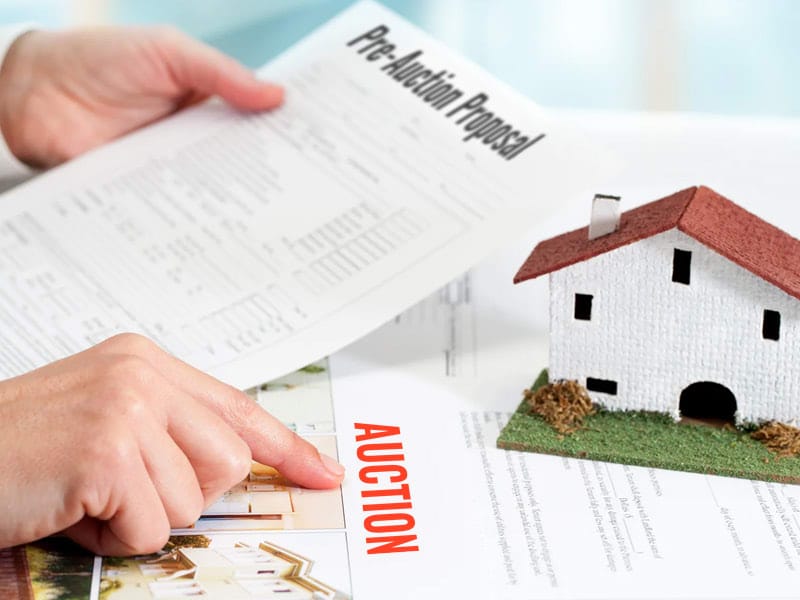Property auctions are a common occurrence in Australia, but the profit of such transactions isn’t guaranteed for sellers. Mistakes in setting the reserve price, nuances of the contract, or overlooking adjacent property features can lead to unfavorable outcomes. Despite the potential pitfalls, there are fundamental steps that could have prevented these issues. The following guide is tailored for those seeking a deeper understanding of Australian auctions to optimize their profits when selling a home.

Understanding Real Estate Auctions
In Australia, property auctions are orchestrated by an auctioneer hired either by the seller or their real estate agent. A crucial aspect is the seller’s reserve price, the minimum at which the property can be auctioned. When the reserve is met, the property is deemed ‘on the market’ and is awarded to the highest bidder. If the reserve isn’t reached, the property is either ‘passed in’ or ‘withdrawn from auction,’ allowing the highest bidder to negotiate a private sale.
Post-bidding, the winning bidder must furnish an immediate deposit, typically ranging from 5% to 10% of the purchase price, usually paid by check. The remaining balance is settled at the agreed-upon date. The completion of a sales transaction is marked by the signing of the contract and the fulfillment of all necessary payments by both the buyer and seller.
How the Auction Reserve Price is Established
Typically, property owners engage with a real estate agent to determine the reserve price before an auction. The agent plays a crucial role in providing the seller with insights to gauge the competitiveness of the auction and the achievable price. Throughout the auction campaign, the agent offers the seller information on various aspects:
- The number of property viewings.
- The frequency of repeat property examinations.
- The count of building and pest inspections, as well as stratum reports.
- The volume of requested contracts.
- Details on who sought modifications to the contract.
- Background information on potential buyers.
- Any offers that have been presented.
- Assessment of competing advertisements.
- Overview of general market conditions.
Despite the valuable guidance offered by agents, not all sellers heed their advice. Some may distrust their agents, while others may have a predetermined price in mind, shaping the reserve accordingly. In exceptional cases, an independent entity, such as a registered surveyor, may set the reserve, particularly in instances like divorce or when the public trustee sanctions the property’s sale.
At Printforce, we provide a real estate listing database to empower agents in efficiently conducting this analysis.

Pre-Auction Proposals
Should you opt to entertain pre-auction offers, potential buyers have the opportunity to submit offers through an agent before the auction commences. This could involve a signed contract, and the negotiation process mirrors that of a private sale.
It’s important to note that if a buyer submits an offer, and it is accepted within less than three clear business days before the scheduled auction date, the buyer forfeits the cooling-off period.
Preparations Before the Auction
Ensure a seamless process with this straightforward checklist for both real estate agents and sellers:
- Conduct a thorough property viewing and research. Essential to do prior to the auction, providing a realistic understanding of the property’s value. Note that procedures may differ across Australian states; for instance, building inspection is mandatory in Queensland.
- Review the building and pest report. The real estate agent may recommend additional inspections, such as a pest inspection.
- Set conditions. Auctions are apt for scenarios where the owner seeks an unconditional sale (unlike a regular contract, there is no 5-day period when you can back out) or desires specific terms of sale, like settlement terms, that align with the seller’s preferences.
- Establish an end date. Imposing a “cut-off date” instills a sense of urgency in buyers, motivating them to make a decision on that particular day, potentially yielding swift results.

On Auction Day
On the day of the auction, the agent will strategically place documentation around the property at least 30 minutes before the scheduled start time.
Before commencing the auction, the auctioneer will undertake the following steps:
- Briefly outline all applicable state and federal laws governing property auctions, along with any specific rules for that particular auction. Notably, in Queensland, buyers are required to legally register with auctioneers before placing a bid.
- Disclose whether vendor bids will be employed.
The auction officially begins with the auctioneer inviting an opening bid. Subsequently, buyers actively participate by presenting their offers.
Collaborating with the auctioneer, you’ll determine bid increments, typically starting at $5,000 or $10,000 increments. Buyers have the flexibility to bid varying amounts, and the auctioneer retains the discretion to accept or decline these bids.
Should a property reach the predetermined reserve price during the auction, any bid made thereafter will secure ownership of the property.

Finalizing the Purchase and Sale Agreement
Immediately following the auction, the successful bidder is requested to sign an agreement formalizing their offer. Acceptance of the offer is confirmed by both parties signing the contract, and a copy of the signed contract is provided to both you and the buyer.
Given the nature of an auction, the buyer is obligated to provide a deposit upon signing the contract, and conditions cannot be added to the agreement. Some buyers may not have all the details in order on the auction day, allowing for potential negotiations to modify the contract, and permitting a partial deposit with the remaining amount to be paid on a specified date.
It’s crucial to note that there is no cooling-off period for buyers of properties acquired at auction.
The purchase and sale transaction is considered complete upon settlement if:
- All necessary checks, such as property condition and land size, have been conducted.
- Title and transfer documents have been exchanged.
- The entire purchase price balance has been successfully paid.

Key Terms in Property Auctions
Reserve Price: This represents the minimum amount determined by the seller, indicating the lowest bid they are willing to accept.
Passed In: If the auction bids do not meet the seller’s set reserve price, the auction is considered ‘passed in.’ The highest bidder then has the opportunity to engage in negotiations with the seller to finalize a sale.
Hammer Falls: As the auction nears its conclusion, the auctioneer signals the ‘fall of the hammer,’ calling for any last bids. Once the hammer falls, no further bids will be entertained.
Bidder Guide: Distributed prior to the auction, this guide furnishes information on registration procedures, necessary paperwork, auction rules and regulations, and privacy laws.
Dummy Bids: These are fraudulent bids placed by individuals hired by the seller to artificially inflate the property’s price. While dummy bidding is illegal in Australia, the practice continues to persist.
Vendor Bids: A single bid made by the auctioneer on behalf of the seller to assist in reaching the reserve price.



'What any Real Estate Agent in Australia should know to sell a house at auction' have no comments
Be the first to comment this post!